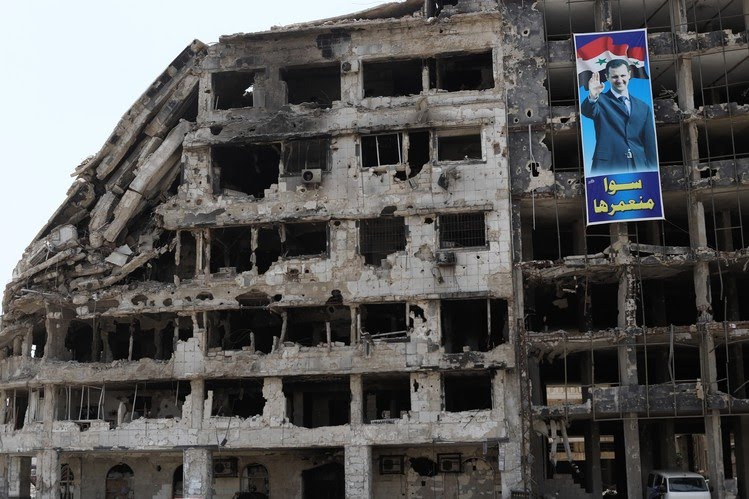Sophie Fullerton – the Washington post
Sophie Fullerton is a political scientist and hum rights researcher based in New York.
Last November, around the same time the Irish travel vlogger Janet Newenham was filming videos of her strolls through Damascus and Aleppo, five members of a family, including three children, were killed in a Russian airstrike in northwest Syria. But none of Newenham’s 170,000 YouTube subscribers would have learned that from her upbeat dispatches — in her videos, Syria is not a country at war.
After a scorched-earth war — supported by Iranian forces, sectarian militias and the Russian air force — Bashar al-Assad’s regime has regained control of much of Syria, but more than half its population remains displaced, and the rest languish under the same suffocating terror that inspired them to rise up against the regime in 2011.
The regime’s victory, however, has come at a price. It is now an international pariah, strangled by sanctions, indebted to both Iran and Russia. It needs an economic lifeline, and it needs it fast. But it is hard to convince investors that the country is open to business when its image remains wedded to a brutal war.
After the fall of Aleppo six years ago, the regime tried to recruit international journalists to help rehabilitate its image. Assad’s father-in-law, Fawaz al-Akhras, paid many to visit Damascus and meet high officials, including Assad himself. The effort was a PR disaster. Most reporters wrote critically about their experience, and the regime learned a valuable lesson: As long as Syria is seen through a political lens, it will struggle to get favorable coverage.
Over the past few years, the regime has been earnestly recruiting YouTubers and influencers to help burnish the country’s image. The idea is ingenious since most travel influencers consider themselves apolitical, and their audiences are mainly interested in sights, sounds and flavors. The conventional tone of such videos is cheery, with little room for reminders of tragedy. To the extent that the videos acknowledge Syria’s destruction, it becomes part of the aesthetic, adding a hint of danger and pique to the adventure. On Instagram and TikTok, it’s not uncommon to see influencers posing in front of ruined neighborhoods. To them, it’s all part of the exotic Levantine experience, along with the country’s souks, bazaars, mosques, castles and restaurants.
The influencers enter the country through a visa granted only when one arranges accommodations through a regime-approved travel agency. The regime vets all visa applications to weed out journalists and activists. Once in Syria, the travelers are assigned minders, usually in the guise of translators.
While most influencers seem indifferent to the country’s recent horrors, some do have a sense of moral culpability. Protestations about not having a “political agenda” are thus common. “None of the videos … are meant as a political commentary,” Newenham says, for example. But in another video, she follows this with the claim that Homs — one of the earliest opposition bastions to be besieged and destroyed by the regime — was leveled by “airstrikes from people outside of Syria.” The equally “apolitical” TikTok influencer Davud Akhundzada blames the country’s destruction on the Free Syrian Army for taking up arms against Syria’s government: “As a result, this is what he have left,” he says, pointing at destroyed neighborhoods.
The regime exploits the influencers’ naivete and opportunism. It amplifies their comments declaring Syria safe and secure through official media. But even without explicitly parroting regime pronouncements or producing PR for it, these influencers are advancing the regime’s agenda by imparting the false impression that the country’s troubles are behind it. Most Syrians still suffer in internal exile or as refugees abroad. More than 100,000 have simply disappeared in the regime’s torture chambers.
While most Syrians don’t have the freedom to visit their own homes, they are seeing insensitive tourists, indifferent to their pain, trampling around their neighborhoods, desecrating the sites of mass crimes. Such tourism is unethical because even its innocuous frames conceal horrors. Newenham, for example, speaks enthusiastically about her visit to Bab Tuma but seems oblivious to the fact that she is a short distance from the Air Force Intelligence’s local branch, which Human Rights Watch has identified as one of the country’s main torture facilities.
While the value of such tourism to the regime is obvious, it is more troubling that many posts have been sponsored by Western companies. Duolingo, Surfshark and Skillshare have all sponsored videos produced during these atrocity safaris, and the vloggers have been able to monetize such content on YouTube. In a statement, a spokesperson for Google — YouTube’s parent company — said it requires creators and advertisers to comply with all applicable sanctions and demonetize any content that violates its policies. They did not address the Syria videos specifically, however.
In one YouTube video, English vlogger Benjamin Rich even used abandoned homes as a backdrop to sell Surfshark subscriptions. (A Surfshark representative told me they will investigate the video after I brought it to their attention.)Newenham acknowledges some reservations in her videos, but when I reached out to her for comment, she declined to answer any questions.
It’s clear these influencers don’t want to deal with the political and ethical implications of their travel. We can’t police people’s consciences. But we can question whether the companies sponsoring such tourism are violating the sanctions placed on the regime because of its human rights violations.



















